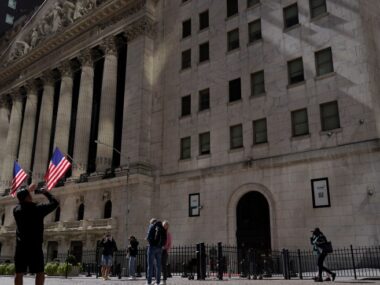A memo, under a thousand words and filled with right-wing rhetoric, plunged the US economy into uncertainty on Monday night as the Trump administration ordered a suspension of federal grants and loans worth hundreds of billions of dollars.
The memo, written by the acting director of the Office of Management and Budget, explicitly stated that federal funds should reflect Trump’s priorities, particularly targeting the cessation of “wokeness.” It criticized using federal money for initiatives such as “Marxist equity, transgenderism, and green new deal social engineering” and instructed all federal agencies to halt fund disbursements for review.
This directive, with its unclear language, created immediate chaos in organizations across sectors reliant on federal funding—ranging from healthcare and emergency aid programs to cancer research and veteran services. As reported by CNN, the suspension even impacted a program providing caskets for deceased veterans without next of kin.
By Tuesday evening, a federal judge temporarily blocked part of the freeze on federal aid. Still, the situation remained clouded with uncertainty, as key questions, such as whether Medicaid would be affected, went unanswered. However, it was clear that any disruption in federal funding would have far-reaching effects on the US economy.
This move is part of Trump’s goal to shift control of government spending away from Congress and, according to legal experts, likely violates constitutional limits on executive power. Samuel Bagenstos, a law professor at the University of Michigan, explained that the executive branch can only delay spending under certain conditions, none of which include the president’s opposition to underlying policies.
The order highlights Trump’s willingness to take significant risks. By issuing it, he threatens the stability of one of the most robust economies in recent history.
Despite predictions of an economic downturn, the US economy has defied expectations, with the labor market staying strong even amid inflation and high interest rates. In contrast to Trump’s campaign rhetoric, the economy is in a strong position—inflation is under control, interest rates are falling, and consumer spending has spurred consistent GDP growth. However, these conditions aren’t guaranteed to endure, especially if disruptions to federal funding harm workers and businesses reliant on government support.
In the short term, the economic impact might not be catastrophic for the economy as a whole, but it could be devastating for individuals. Wendy Edelberg of The Hamilton Project emphasized that if the disruption persists, it could escalate into a crisis, leading to broader concerns about the state of the country.
Like a shutdown, but worse
Trump officials attempted to alleviate concerns by stating that the OPB memorandum was “not a blanket pause” on all federal programs, but only those aligned with Democratic priorities. However, this clarification seemed to confuse the issue further. The White House later stated that Medicaid was exempt from the order, but some state Medicaid agencies reported losing access to essential funds used to pay hospitals, doctors, and insurers.
Brendan Duke, a senior director at the Center for American Progress, commented, “It would have been better if they had clarified their policy before making the announcement. This feels like a partial, unilateral government shutdown by the president.”
This situation might be even more problematic than the typical federal shutdowns caused by Congress failing to reach a budget agreement, which leads to halting non-essential services and closing national parks. The Trump administration’s freeze on federal grants, however, affects mandatory spending already approved by Congress.
Edelberg noted, “This isn’t part of the usual government shutdown scenario. We have no framework for situations where essential programs, like children’s health insurance, aren’t funded. This goes beyond the typical disruptions caused by appropriations issues.”
The full impact of the grant freeze is hard to measure without knowing which programs are affected and for how long. However, the consequences are likely to extend beyond those directly dependent on federal assistance or jobs funded by these programs. Economies are complex systems, and policies that disrupt them cannot easily be adjusted to fit political agendas—they affect real people with real financial obligations.
Zack Mabel, director of research at Georgetown University, stated, “It’s unrealistic to believe the economy will remain resilient no matter what policies are implemented. We’re testing the stress resistance of our economy and labor market, but this is a risky experiment with significant consequences. To say we’re playing with fire would be an understatement.”











